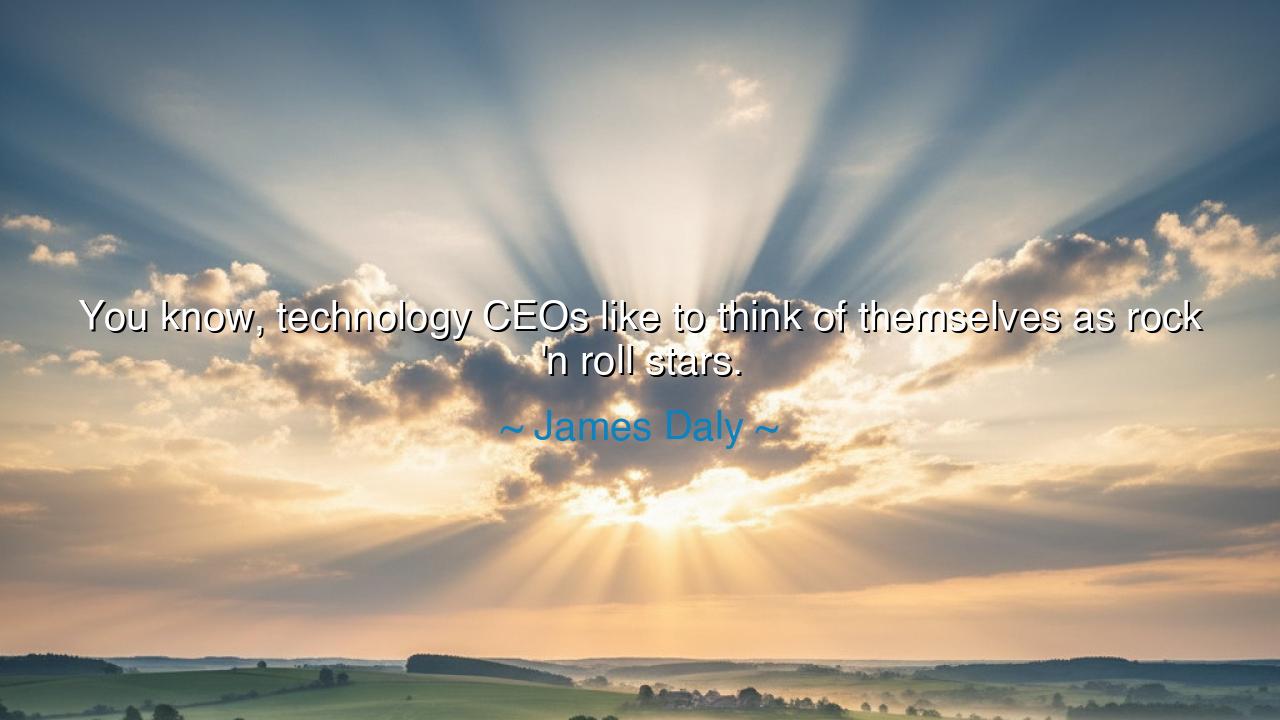
You know, technology CEOs like to think of themselves as rock 'n






Hear the words of James Daly, cast in both humor and warning: “You know, technology CEOs like to think of themselves as rock ’n roll stars.” This saying, though light on the surface, holds deep truths about human vanity and the lure of glory. For in every age, those who wield power—whether through sword, pen, or machine—have longed not only to build, but to be adored. And herein lies the tension: between the noble calling of innovation and the dangerous temptation of self-idolatry.
When Daly speaks of technology CEOs, he points to those who command vast empires of code, networks, and devices—leaders who, through invention, shape the lives of millions. Yet rather than walking in humility, many adorn themselves with the cloak of celebrity, desiring applause more than wisdom, image more than substance. They see themselves as rock ’n roll stars, bathed in the lights of admiration, worshipped by crowds, but often forgetting that fame is as fleeting as smoke upon the wind.
The ancients knew this peril well. Consider the tale of Nero, emperor of Rome, who fancied himself not as a ruler but as a performer upon the stage. He craved the cheers of the masses more than the welfare of his people, and so squandered his empire in pursuit of shallow glory. In like manner, when leaders of technology forget their duty to serve and instead hunger for the frenzy of adoration, they risk the downfall not only of themselves but of the very systems they command.
Yet Daly’s words also carry irony, for there is truth in the comparison. The rock ’n roll star of old shattered conventions, brought energy and chaos, and gave voice to generations. Likewise, many technology leaders have indeed reshaped the world, broken barriers, and filled the earth with new rhythms of communication, commerce, and connection. But while the musician’s rebellion fades in echoes, the choices of a technology CEO may change the destiny of nations. Thus their power is greater, and their responsibility far heavier.
One must also see the deeper current: that humanity often exalts its creators, confusing invention with virtue. When technology is elevated beyond measure, its masters are treated as prophets, even gods. But wisdom teaches us that no machine can make a man immortal, nor can applause crown him with lasting honor. Only integrity, humility, and service grant a legacy that endures. The star of vanity burns bright but soon collapses; the flame of service may burn quietly but endures through the generations.
The lesson, then, is clear: do not mistake fame for greatness, nor applause for truth. If you rise to lead—whether in technology, art, or any craft—remember that your calling is not to dazzle the crowd but to strengthen the people. Seek the glory not of the stage, but of the work well done, the lives improved, the trust preserved. For the true measure of leadership is not how loudly the world sings your name, but how deeply it is changed by your labor.
Practically, this means we must cultivate humility even as we pursue greatness. If fortune brings you influence, wear it lightly. Serve others before serving ego. And if you stand among the crowd watching the so-called rock ’n roll stars of technology, do not be deceived by the lights and noise; look instead to the fruit of their work, and measure them not by their fame, but by their faithfulness.
Thus the words of James Daly ring with the laughter of irony, yet carry the gravity of warning. Technology CEOs may adorn themselves like idols of the stage, but let us remember: stars rise and fall, but service and wisdom endure. Let every generation take this truth to heart, that we may not be blinded by the brilliance of showmen, but guided by the steady light of those who lead with humility, purpose, and care.






AAdministratorAdministrator
Welcome, honored guests. Please leave a comment, we will respond soon